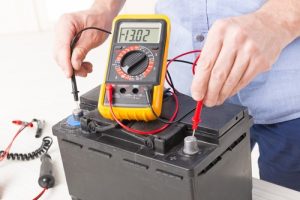Multimeter: What It Is and When to See a Mechanic
Your car’s electrical system powers key parts like the battery, headlights, and sensors. Since these systems can fail without warning, using a multimeter helps diagnose problems fast. Whether you’re driving through Virginia Beach or headed to the boardwalk, knowing how your car’s electrical system works can save you time and money.
At Meineke on Diamond Springs Road in Virginia Beach, our ASE-certified mechanics use multimeters and other diagnostic tools to test your battery, alternator, and wiring. So, in this post, the experts at Meineke explain what a multimeter is, how it works, why it’s important, how to maintain it, and when to see a mechanic.
So, What Is a Multimeter and How Does It Work?
A multimeter is a small handheld tool that measures voltage, current, and resistance. Since today’s vehicles rely on complex electronics, a multimeter helps test if power is flowing where it should. Mechanics use it by attaching two leads to a battery, fuse, or wire.
If there’s a problem, then the tool shows whether something is weak, broken, or disconnected.
So, Why Is a Multimeter Important?
Because electrical systems run most of your car’s features, the multimeter is a key tool for fast diagnosis.
-
Finds battery problems early – If your car won’t start, then a multimeter checks if the battery has enough voltage.
-
Checks your alternator output – If your car loses power while driving, then testing the alternator can confirm the cause.
-
Locates broken wires or short circuits – If a light or sensor fails, then the multimeter helps find the bad connection.
-
Takes the guesswork out of repairs – If there’s no clear sign of damage, then testing gives a clear answer.
So, How Do You Maintain or Use a Multimeter?
A multimeter is easy to use and doesn’t need much care. But keeping it in good shape helps it last longer.
-
Store it in a dry, cool place – If it stays clean and dry, then it will stay accurate.
-
Check its battery often – If the screen won’t turn on, then it may just need a new battery.
-
Be careful with the test leads – If they’re damaged, then the readings might be wrong.
-
Use it only on safe systems if you’re not trained – If you’re unsure, then it’s best to leave the testing to a pro.
So, When Should You See a Mechanic in Virginia Beach?
Some electrical problems need expert tools and training. Visit Meineke in Virginia Beach if:
-
When your car won’t start, even with a charged battery, the system may need testing.
-
If your headlights dim or flicker, your alternator may not be charging correctly.
-
When dashboard warning lights stay on, a sensor or fuse may be failing.
-
If you smell something burning or fuses blow often, your wiring could be shorting out.
-
When you’re unsure where the issue is, a mechanic can use a multimeter to find the answer fast.
So, Call Meineke in Virginia Beach Today for an Electrical Diagnostic Check
Since your car’s electronics keep it running safely and smoothly, diagnosing problems early can prevent bigger issues. But if your lights flicker, your car won’t start, or you see warning lights, Meineke on Diamond Springs Road in Virginia Beach is ready to help. Whether you need a multimeter test, a battery check, or a full electrical inspection, our ASE-certified team will find and fix the problem. So, don’t wait until you’re stranded—call Meineke today for a quick check-up.
If the Meineke on Diamond Springs Road in Virginia Beach is not convenient, also check out these other locally-owned Meineke locations in Virginia:
- Meineke Virginia Beach #197
6399 Indian River Road
Virginia Beach, VA 23464-3500
Call (844) 768-6004 - Meineke Virginia Beach #312
1837 Laskin Road
Virginia Beach, VA 23454-4504
Call (833) 696-8494 - Meineke Virginia Beach #2739
1321 Diamond Springs Rd
Virginia Beach, VA 23455
Call (757) 687-0566 - Meineke Virginia Beach #2883
3700 Holland Rd
Virginia Beach, VA 23452
Call (757) 932-2952 - Meineke Charlottesville #342
1906 Emmet Street
Charlottesville, VA 22901-2815
Call (855) 747-2083 - Meineke Hampton #584
79 West Mercury Boulevard
Hampton, VA 23669-2508
Call (757) 690-7689 - Meineke Yorktown #851
4609 George Washington Memorial Highway
Yorktown, VA 23692-2766
Call (757) 847-9155 - Meineke Williamsburg #938
399 Second Street
Williamsburg, VA 23185
Call (757) 585-4492 - Meineke Denbigh #1088
415 Oriana Road
Newport News, VA 23608
Call (757) 814-2724 - Meineke Richmond #2514
5271 S Laburnum Avenue
Richmond, VA 23231
Call (804) 222-2862

